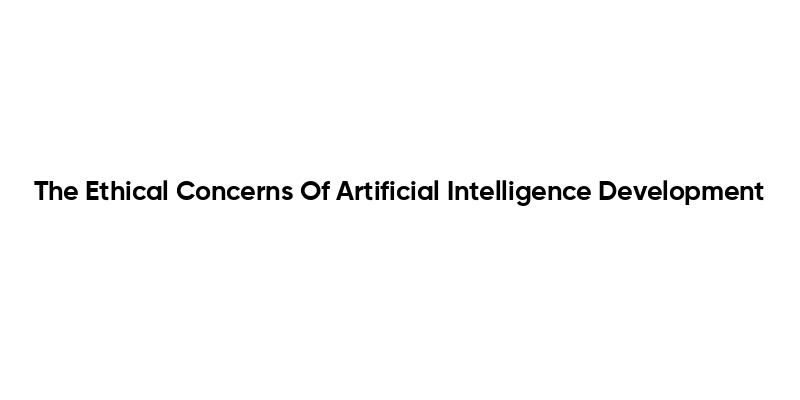As artificial intelligence (AI) continues to evolve and integrate into various aspects of our lives, the ethical concerns of artificial intelligence development have become increasingly prominent. Issues such as algorithmic bias, data privacy, and the accountability of AI systems raise critical questions about the implications of this technology. Understanding these ethical dilemmas is essential for developers, policymakers, and society as a whole, as we navigate the complexities of AI’s impact on our future.
In this article, we will delve into the multifaceted ethical concerns surrounding AI development. You will learn about the potential for bias in AI algorithms and how it can perpetuate existing inequalities. We will also explore the importance of data privacy and the ethical responsibilities of organizations in safeguarding personal information. Furthermore, we will discuss the need for accountability in AI systems, examining who is responsible when these technologies fail or cause harm.
By the end of this article, you will have a comprehensive understanding of the ethical landscape of artificial intelligence development. We encourage you to continue reading as we unpack these critical issues and highlight the importance of ethical considerations in shaping the future of AI. Join us on this journey to better understand how we can harness the power of AI responsibly and ethically.
Bias and Discrimination in AI Systems
One of the most pressing ethical concerns in artificial intelligence development is the potential for bias and discrimination. AI systems are often trained on historical data, which may contain inherent biases. If these biases are not addressed, the AI can perpetuate and even amplify existing inequalities. For instance, facial recognition technology has been shown to have higher error rates for individuals with darker skin tones, leading to significant ethical implications in law enforcement and surveillance.
Addressing bias in AI requires a multi-faceted approach, including diverse training datasets, regular audits of AI systems, and the implementation of fairness metrics. Developers must prioritize ethical considerations during the design phase to ensure that AI technologies serve all segments of society equitably. This not only enhances the reliability of AI systems but also fosters public trust in these technologies.
Privacy Concerns and Data Security
As AI systems often rely on vast amounts of personal data, privacy concerns are paramount. The collection, storage, and processing of sensitive information can lead to significant risks if not managed properly. Data breaches can expose personal information, leading to identity theft and other malicious activities. Moreover, the use of AI in surveillance raises questions about the right to privacy and the potential for misuse by governments or corporations.
To mitigate these risks, developers must implement robust data protection measures, including encryption and anonymization techniques. Additionally, transparency in data usage and obtaining informed consent from users are essential practices. By prioritizing privacy and data security, AI developers can create systems that respect individual rights while still harnessing the power of data-driven insights.
Accountability and Transparency in AI Decision-Making
Another critical ethical concern is the accountability and transparency of AI decision-making processes. As AI systems become more autonomous, understanding how they arrive at specific decisions becomes increasingly complex. This lack of transparency can lead to a “black box” scenario, where users and stakeholders cannot comprehend or challenge the outcomes produced by AI.
To address this issue, developers should strive for explainable AI (XAI) solutions that provide insights into the decision-making processes of AI systems. Establishing clear accountability frameworks is also essential, ensuring that there are mechanisms in place to address grievances and rectify errors. By fostering transparency and accountability, AI technologies can be more effectively integrated into society, enhancing user confidence and ethical compliance.
The Impact of AI on Employment and Labor Markets
The rise of artificial intelligence poses significant implications for employment and labor markets. While AI has the potential to enhance productivity and create new job opportunities, it also threatens to displace workers in various sectors. Automation of routine tasks can lead to job loss, particularly for low-skilled workers, raising ethical questions about the responsibility of AI developers and businesses to mitigate these impacts.
To address these challenges, stakeholders must engage in proactive workforce planning and reskilling initiatives. Companies should invest in training programs that equip employees with the skills needed to thrive in an AI-driven economy. Policymakers also play a crucial role in creating safety nets and support systems for displaced workers, ensuring that the transition to an AI-enhanced workforce is equitable and just.
The Ethical Use of AI in Warfare and Autonomous Weapons
The development of AI technologies for military applications raises profound ethical concerns, particularly regarding autonomous weapons systems. The potential for AI to make life-and-death decisions without human intervention poses significant moral dilemmas. Questions arise about accountability in the event of unintended consequences, such as civilian casualties or escalation of conflicts.
To navigate these ethical challenges, international regulations and frameworks must be established to govern the use of AI in warfare. Engaging in dialogue among nations, technologists, and ethicists is crucial to ensure that AI technologies are used responsibly and ethically in military contexts. By prioritizing human oversight and ethical considerations, the development of AI in warfare can be aligned with humanitarian principles.
| Concern | Description |
|---|---|
| Bias and Discrimination | AI systems can perpetuate or even exacerbate existing biases in data, leading to unfair treatment of individuals based on race, gender, or other characteristics. |
| Privacy Issues | The collection and analysis of personal data by AI systems raise significant privacy concerns, as individuals may not be aware of how their data is being used. |
| Accountability | Determining who is responsible for the actions of AI systems can be challenging, especially in cases of harm or error. |
| Job Displacement | The automation of tasks through AI can lead to job losses in various sectors, raising concerns about economic inequality and workforce displacement. |
| Security Risks | AI technologies can be exploited for malicious purposes, such as creating deepfakes or conducting cyberattacks, posing risks to individuals and society. |
| Autonomy and Control | As AI systems become more autonomous, there are concerns about losing human control over critical decisions, especially in areas like military applications. |
| Transparency | Many AI systems operate as “black boxes,” making it difficult to understand how decisions are made, which can hinder trust and accountability. |
| Ethical Use of AI | There is an ongoing debate about the ethical implications of using AI in various fields, including healthcare, law enforcement, and surveillance. |
This HTML document provides a structured overview of the ethical concerns associated with artificial intelligence development, formatted as a table for clarity and ease of reading.



